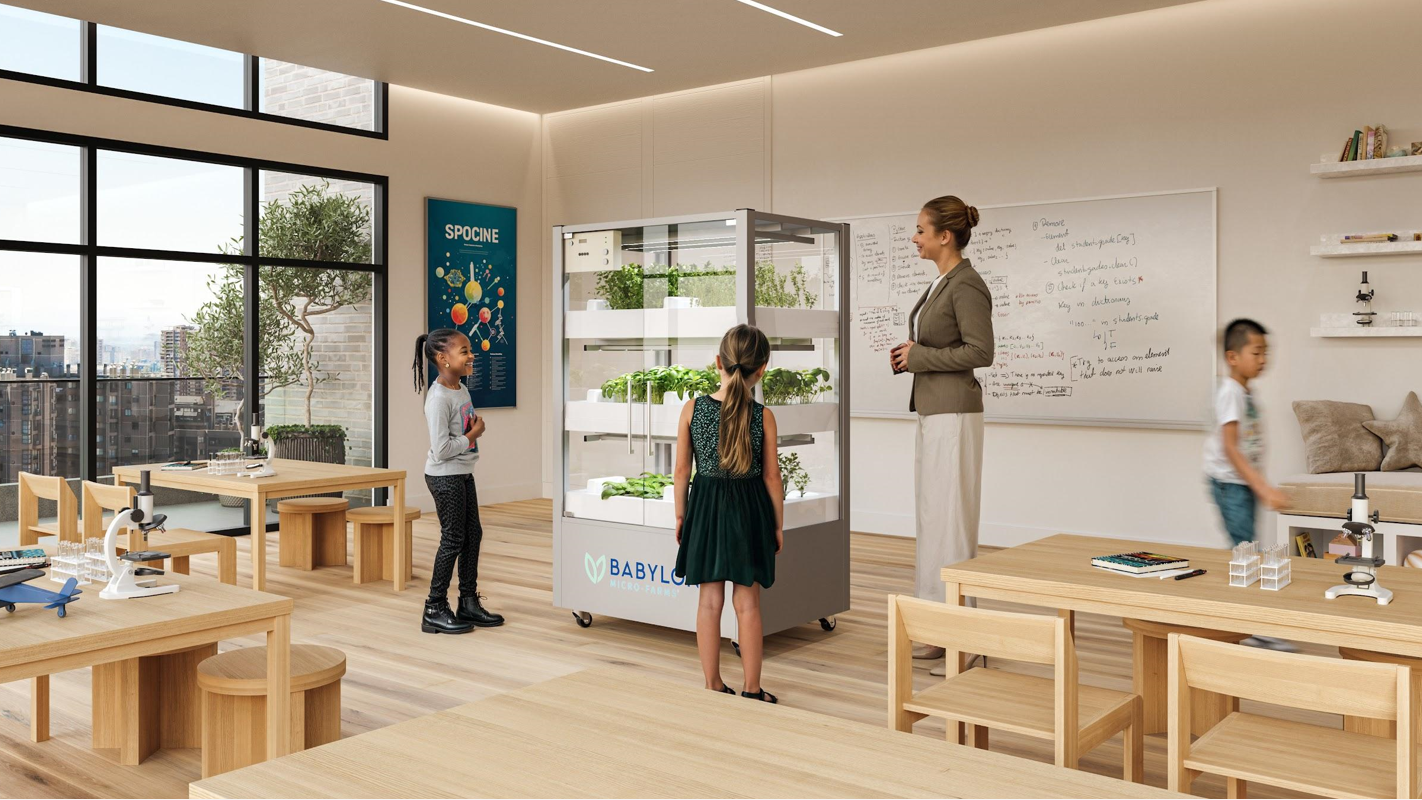
Babylon Micro-Farms recently unveiled a new product called the STEM Garden, an indoor farming unit intended for education. (Courtesy Babylon Micro-Farms)
A local indoor farming startup is zeroing in on a new customer base: K-12 schools.
Babylon Micro-Farms recently unveiled The STEM Garden, a hydroponic device used to grow vegetables indoors and geared toward classroom instruction.
The STEM Garden is a smaller version of the company’s Galleri Micro-Farm unit, which was rolled out in May 2022. Babylon sells or leases these hydroponic systems to businesses and then uses its own in-house software to remotely manage the farms for clients.
Both units are manufactured by Babylon at its headquarters in Scott’s Addition.
The less expensive and more compact STEM Garden is aimed at schools looking to expand their science curriculum with a hands-on learning experience. The idea is that schools will buy the units and use them in classroom instruction by allowing students to seed, cultivate and harvest plants. The STEM Garden can grow 90 plants and yield 2 pounds of produce every week.
The Galleri is intended to grow food for consumption, and the unit is targeted at customers such as universities, corporate cafeterias and senior living facilities that want an on-site source of greens for their menus. Babylon’s Galleri clients include IKEA, American Airlines, Aramark, Sodexo, Arizona State University, Dartmouth College and other organizations, according to the company’s website.
The Galleri, which Babylon operates remotely for customers using its subscription-based BabylonIQ software, can hold 280 plants such as leafy greens, herbs and edible flowers.
“The Galleri is this fine-tuned automatic device we run remotely, but it means you’re not really involved in planting the seeds and introducing the nutrients,” Babylon CEO Alexander Olesen said. “We designed (the STEM unit) experience so you can really leverage every step from seed to harvest.”
The STEM Garden costs $6,500 per unit, compared to the $15,000 price tag of the Galleri. The Galleri measures 67 inches wide, about 30 inches deep and about 80 inches tall, while the STEM Garden is 40 inches wide, about 29 inches deep and 62 inches tall.
Babylon anticipates it will start to ship STEM Garden units in June. The company unveiled the new product publicly earlier this year and started taking orders in February.
The company declined to share on how many orders it had received for the STEM farms as of Wednesday.
The STEM unit was born out of the interest of educators, who told Babylon they wanted a lower cost unit geared toward science education, Olesen said.
Olesen said the unit is pitched as having relevance to education in biology, engineering, nutrition and other topics. He said Babylon has sold “hundreds” of the Galleri units, some of which have been used in education settings but the price was a hurdle to broader use in the education world.
Olesen said that while the STEM Garden is geared toward school children, Babylon sees the unit as a major step toward lower cost versions of its main indoor farm unit for other applications and industries, including units tailored and priced to be considered a household good.
“As a company, our goal from the start has been to make hydroponics access for everyone, and driving costs down is the best way to effect that change,” Olesen said. “We see a future where there will be micro farms in every home in the country. I think there’s a very clear path for indoor farming applications to be in the thousand-dollar-or-less range and sold with other household products.”
Olesen and Graham Smith founded Babylon in Charlottesville in 2017. The company relocated to its current headquarters at 3409 Carlton St. in 2021. The company had about 40 employees as of last month.
A Babylon spokesman declined to comment on the total amount of funding the company has secured to date, or whether Babylon is profitable. The company has raised at least $17.5 million from investors so far, according to SEC filings and previous BizSense reporting.

Babylon Micro-Farms recently unveiled a new product called the STEM Garden, an indoor farming unit intended for education. (Courtesy Babylon Micro-Farms)
A local indoor farming startup is zeroing in on a new customer base: K-12 schools.
Babylon Micro-Farms recently unveiled The STEM Garden, a hydroponic device used to grow vegetables indoors and geared toward classroom instruction.
The STEM Garden is a smaller version of the company’s Galleri Micro-Farm unit, which was rolled out in May 2022. Babylon sells or leases these hydroponic systems to businesses and then uses its own in-house software to remotely manage the farms for clients.
Both units are manufactured by Babylon at its headquarters in Scott’s Addition.
The less expensive and more compact STEM Garden is aimed at schools looking to expand their science curriculum with a hands-on learning experience. The idea is that schools will buy the units and use them in classroom instruction by allowing students to seed, cultivate and harvest plants. The STEM Garden can grow 90 plants and yield 2 pounds of produce every week.
The Galleri is intended to grow food for consumption, and the unit is targeted at customers such as universities, corporate cafeterias and senior living facilities that want an on-site source of greens for their menus. Babylon’s Galleri clients include IKEA, American Airlines, Aramark, Sodexo, Arizona State University, Dartmouth College and other organizations, according to the company’s website.
The Galleri, which Babylon operates remotely for customers using its subscription-based BabylonIQ software, can hold 280 plants such as leafy greens, herbs and edible flowers.
“The Galleri is this fine-tuned automatic device we run remotely, but it means you’re not really involved in planting the seeds and introducing the nutrients,” Babylon CEO Alexander Olesen said. “We designed (the STEM unit) experience so you can really leverage every step from seed to harvest.”
The STEM Garden costs $6,500 per unit, compared to the $15,000 price tag of the Galleri. The Galleri measures 67 inches wide, about 30 inches deep and about 80 inches tall, while the STEM Garden is 40 inches wide, about 29 inches deep and 62 inches tall.
Babylon anticipates it will start to ship STEM Garden units in June. The company unveiled the new product publicly earlier this year and started taking orders in February.
The company declined to share on how many orders it had received for the STEM farms as of Wednesday.
The STEM unit was born out of the interest of educators, who told Babylon they wanted a lower cost unit geared toward science education, Olesen said.
Olesen said the unit is pitched as having relevance to education in biology, engineering, nutrition and other topics. He said Babylon has sold “hundreds” of the Galleri units, some of which have been used in education settings but the price was a hurdle to broader use in the education world.
Olesen said that while the STEM Garden is geared toward school children, Babylon sees the unit as a major step toward lower cost versions of its main indoor farm unit for other applications and industries, including units tailored and priced to be considered a household good.
“As a company, our goal from the start has been to make hydroponics access for everyone, and driving costs down is the best way to effect that change,” Olesen said. “We see a future where there will be micro farms in every home in the country. I think there’s a very clear path for indoor farming applications to be in the thousand-dollar-or-less range and sold with other household products.”
Olesen and Graham Smith founded Babylon in Charlottesville in 2017. The company relocated to its current headquarters at 3409 Carlton St. in 2021. The company had about 40 employees as of last month.
A Babylon spokesman declined to comment on the total amount of funding the company has secured to date, or whether Babylon is profitable. The company has raised at least $17.5 million from investors so far, according to SEC filings and previous BizSense reporting.




Curious to see whether this will gain traction with that price tag. Very similar product Hyve LF-One struggled and folded when it tried to market a $1000 unit geared towards school education and in-home consumers, despite its stellar performance. Best of luck and I hope it succeeds.